Monday, September 28, 2009
1981 Hunger Strike: Deconstructing McGuinness
Rusty Nail at Slugger O’Toole
A couple of analogies to start. And then an extended deconstruction of McGuinness’ article from the Irish News.
Picture Gerry Adams as manager of the team, Danny Morrison as Captain. Bik McFarlane is a star player. Gibney is a coach. Imagine the Irish News special as the Cup final. The manager, who never gave public interviews all season, has disappeared. The Captain has absented himself from the field, and taken his star player with him (probably after consulting with Coach Gibney). Reserve player Laurence McKeown, who has performed well in the past, and heretofore unseen on the field McGuinness are the main defence. And that is where they spend the game – stuck in their own box, not even able to contemplate scoring a goal of their own, and barely able to keep the other team from repeatedly netting the ball. Now, knowing they were going into a losing game, it may have been sound strategy to absent the key players from the field at the crucial moment, in order have a ready-made excuse for the coming disaster, but it will do nothing to mitigate what is bound to be a resounding defeat. At the start of the season they were the favourites – but anyone who still has money on them now has woefully misread the underdog.
Where are Morrison and McFarlane? At this point, if we were to believe what they have been saying all along, they should be easily sinking it into the net now, shouldn’t they? Instead, their absence hands a victory to their opposition. “Your silence will not protect you,” the saying goes. Speaking of silence, President-For-Life Adams is still staying schtum on the whole thing. A mixed blessing, given his increasing predilection for inappropriate flights of fancy – but an indictment of the worst aspects of his leadership. The buck stops with him, yet he is quite content to pass it until some loyal dimwit falls on his sword for him. (Any takers on who it will be first?)
The strategy of the Adams cadre has been to bury the story at all costs. But, like the Disappeared risen from the bogs and beaches, this issue will not go away. Bits of bone and matter continue to surface, grisly bits at a time. Their presence and significance cannot be denied. With forensic examination, the bodies are being reassembled and identified. And so too the finger of culpability will find its mark. Those who pay attention to the details, however seemingly mundane or trite, know the significance of each find and can read where the evidence is taking them. The full body of the truth will not appear all at the once; it may never appear 100% conclusively. It’s a slow, sometimes plodding process. It’s been 5 years since the publication of Blanketmen, which was little more than a marking on a map of a remembered grave. Those expecting the full skeleton to sit up and point a bony finger will be forever disappointed. Those who have the ability to use logic and reason, however, understand how far the excavation has come, and how close it is to its conclusion.
We’ll turn our attention now to Martin McGuinness’ piece in the Irish News. The current Deputy First Minister, famous for being one of the Chuckle Brothers alongside former arch-nemesis Ian Paisley, and infamous in certain circles for denouncing Republicans as traitors from the steps of Stormont alongside the Chief Constable of the PSNI, was at the time of the hunger strikes, as referenced in Ed Moloney’s Secret History, the Chief of Staff of the IRA.
So it would be reasonable to expect an insight to what went on in July 1981 with some heft to it. After all, a person in such a position would be more than a mere runner between players in Derry and Belfast. In fact such a person might be able to shed light on more than just the events of July and perhaps – staying within the hunger strike framework – beyond. For example, he might be in a position to shed light on how exactly the contact between Thatcher’s spooks and the IRA was revived during the second hunger strike. Denis Bradley has previously hinted at this, claiming variously that this contact began in a room in Derry as far back as early May.
“I was actually in the room with Robert McLarnon [senior MI5 officer] and IRA leaders when a phone call came from a European summit during the hunger strike. Thatcher was at a European summit but kept in contact with us by phone. An offer was made to republicans to end the hunger strike; it was actually a better deal than the one they eventually settled for. At the time the republican movement was not in control, it was the prisoners who were in control and the leadership could not take on the prisoners. As far as I remember the offer was made after the second hunger striker, Francis Hughes, died. What we were being told was that this was the Prime Minister’s last offer on the hunger strike.” – Denis Bradley, quoted in The Guardian, 17 October 1999
“John Devereux, who died later in the Mull of Kintyre Chinook crash, was meant to have accompanied Robert McLarnon to Derry for the meeting. Instead Robert came on his own. I was in the room when Martin McGuinness said ‘Was this authorised by the British Prime Minister?’ To which McLarnon said ‘Yes’ .” – Denis Bradley, quoted in The Guardian, 17 October 1999
Francis Hughes died on the 12th of May – 2 months before the July offer that preceded Joe McDonnell’s death.
Was a substantial offer made to the IRA leadership as represented by Martin McGuinness before the July offer? Why were the prisoners never told of the Derry meetings between McGuinness and the spooks?
This was after the election and death of Bobby Sands; the British were under enormous pressure; archive material makes clear that Thatcher wanted above all else an end to the hunger strike. This is borne out by the lengths she went to with the back channel negotiations. Even Adams says of her during this time, “she was no stranger to expediency”. Politically, if they were going to make a substantial offer, that would have been an opportune time.
Denis Bradley fleshes out the background behind the negotiations and the private positions of the IRA and Thatcher in this quote from Liam Clarke’s biography of Martin McGuinness:
“My other partners in the Link got very annoyed because they thought a deal was on the table long before it was on the table and the reason it didn’t happen was because the Provos gave away their authority to the hunger strikers themselves – they were far too emotionally involved and in no position to make any judgements because the Provos appeared to hand the whole thing over to them. As far as I can make out from our guys, Thatcher would have made a deal quite early on despite what she said in public.” Denis Bradley, quoted in From Guns to Government, page 130
This makes sense taken in conjunction with Bradley’s comments in 2006,
“but [Thatcher] made an offer of doing the settlement basically on the grounds of what was ultimately settled for, and the person who was on the phone, involved in this linkage, said to the person from the republican movement: “I think you have to take this offer. You should take this offer.” And I think the answer was, no, I think it has to be the prisoners who have to make that up and it didn’t happen and it [the hunger strike] went on.” – Denis Bradley, quoted in The Observer, 30 April 2006
Except, as we know, if the account of an offer being made after the death of Francis Hughes is correct, the hunger strikers, just as it would be two months later in July, were told nothing. The IRA leadership, McGuinness in May and Adams in July, gave the appearance that the prisoners were in control, yet kept them out of the loop, and later over-ruled them when the prison leadership did accept a British offer they were told about.
Martin McGuinness, here for the first time publicly addressing the hunger strike controversy, has about 800 words to make his case. Instead of expanding on any of the above points, he uses the first 260 to give a history lesson – one covered in the main by other background pieces in the same issue. He uses the next 100 to hide behind the skirts of the families of the hunger strikers. When he finally gets to the meat of the matter, he re-hashes old points of Danny Morrison’s – the incredulous idea that the hunger strikers were to rely on word of mouth negotiations before making any decisions! The duplicity of the British reneging on the deal of first hunger strike leading to the hunger strikers’ hard-line! The anti-Republican agenda driven ICJP whose own deal could not be finalised due to dastardly Brits!
Given the nature of the Mountain Climber ‘link’, the idea that it would operate via word of mouth, and, in the pre-mobile phone, pre-email days of 1981, the archaic form of the telephone, should not be shocking. The idea, too, that the British would seek private assurances or confirmation of acceptance before documentation, should come as no surprise. What did come as a surprise was the documentation that detailed Thatcher’s directives to her subordinates upon acceptance from those Provisional leaders she was dealing with.
“The statement has now been read and we await provo reactions (we would be willing to allow them a sight of the document just before it is given to the prisoners and released to the press). It has been made clear (as the draft itself states) that it is not a basis for negotiation.” – Extract from a Telegram from the Northern Ireland Office to the Cabinet Office
We know, too, that the idea that the hunger strikers would not bend due to the British reneging on a deal over the first hunger strike is a complete chimera. There was no deal at the time to renege upon, given that Brendan Hughes called an end to the hunger strike before anything could be completed.
We also now know the reason why the NIO did not send in a representative to stand over the ICJP deal at the crucial moment: Thatcher’s representatives were negotiating with Adams et al and put the ICJP initiative on hold.
So far, McGuinness has used almost 600 of the 800 words he has to make his case by repeating known history and points that have been previously discredited. He sheds no new light on events, or his role in them, apart from a weak admission that it was he who Brendan Duddy gave the details of the early July offer to, and in turn he delivered the details to the Adams committee in Belfast.
He then complains that while people are heralding the release of FOI documents, they aren’t paying attention to the content. Yet he does not illuminate as to what part of the content of the documents he thinks people should be aware of.
This is likely because the content of those documents do not support the narrative he is clinging to. As evidenced by the extract from the telegram quoted above, we see how it confirms the deal sent to the Provos, and that Thatcher issued a directive for it to be released to the prisoners and the press upon acceptance – which we know she never got.
We also see from the content of the documents, which have been verified by Brendan Duddy, the Mountain Climber link who gave the details to McGuinness, that the deal on offer met 4 of the 5 demands.
McGuinness urges readers read the documents and Ten Men Dead – a side by side reading of the offer can be found here: http://www.longkesh.info/category/ten-men-dead/ – and then lifts, almost verbatim, the same point made by Sile Darragh in her letters to the Irish News and Irish Times earlier this year:
“I would encourage people to read this book and the documents released in 2009 and compare it to the allegations of those who never visited the hunger strikers in the prison hospital, never dealt with the prison administration and the British government or liaised with the ICJP (which, on its terms, to be fair, was attempting to resolve the situation)”. – Martin McGuinness, 28 Sept 2009
“Mr O’Rawe didn’t speak to the hunger strikers, didn’t visit the prison hospital or meet the Irish Commission for Justice and Peace.” – Sile Darragh, 21 April 2009
Discerning the original source of these sorts of articles, whom some suspect is none other than Danny Morrison, is akin to ascertaining whether Barrack Obama’s Dreams of My Father was ghostwritten by Bill Ayers. Whether it was actually written by Ayers or not, his fingerprints are all over it, as are Morrison’s on McGuinness’ article.
So we come to the conclusion of McGuinness’s article – are we any wiser as to what happened during that fateful time? Will we be left with any resolution to the controversy? Sadly, no. McGuinness squanders the last of his word count to have a last kick at Thatcher, and to thank the hunger strikers obliquely for their sacrifice which has led to his seat at Stormont today.
The irony being that the oft repeated thanks supports the claims that they were sacrificed for Sinn Fein’s political gain, which delivered McGuinness to that Big House on the Hill as a Minister of the British Crown.
Sourced from Slugger O’Toole
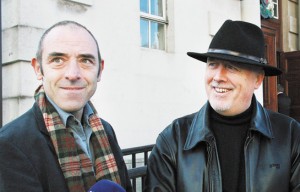
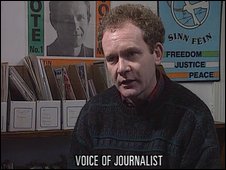 Stature of ten men unassailed
Stature of ten men unassailed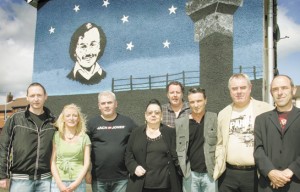
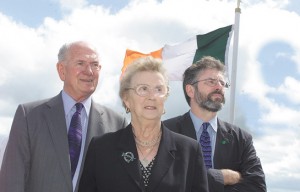
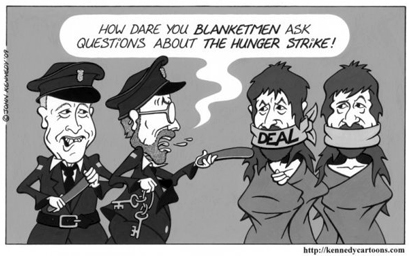
 It has withstood the blows of a million years, and will do so to the end.
It has withstood the blows of a million years, and will do so to the end.